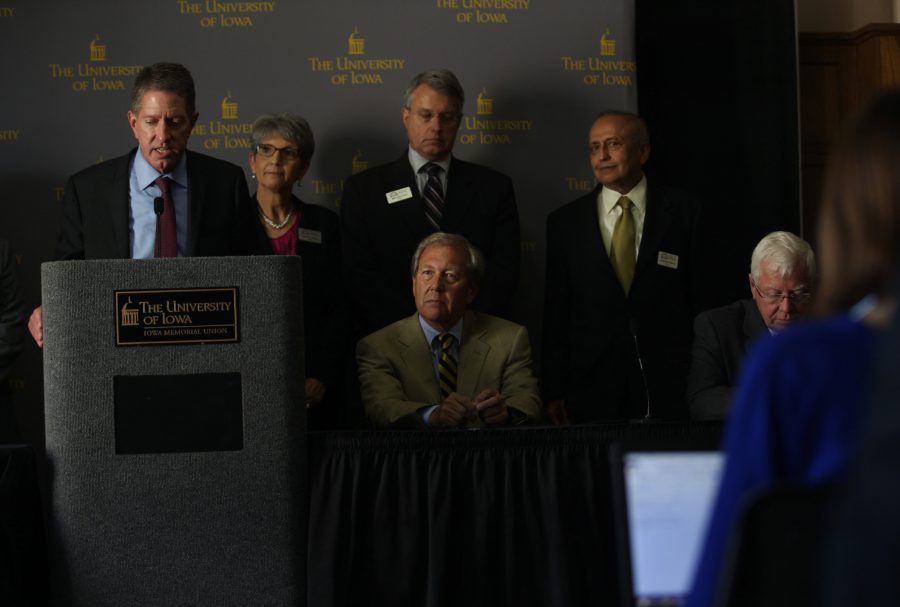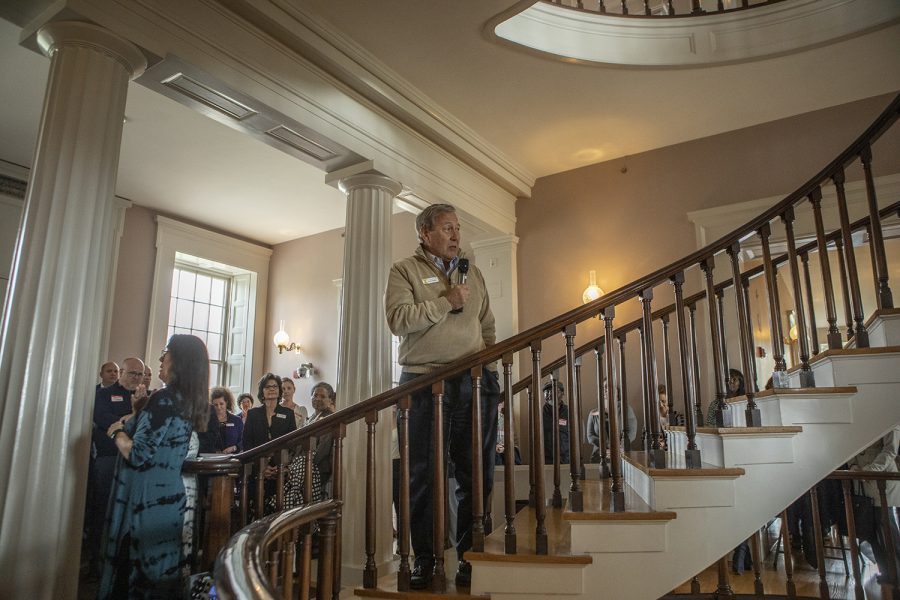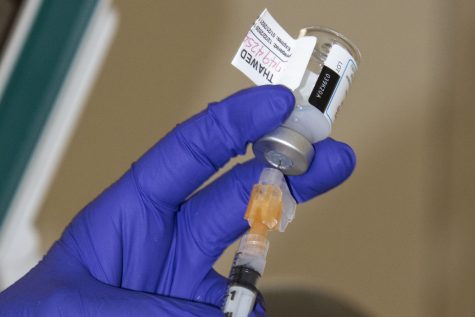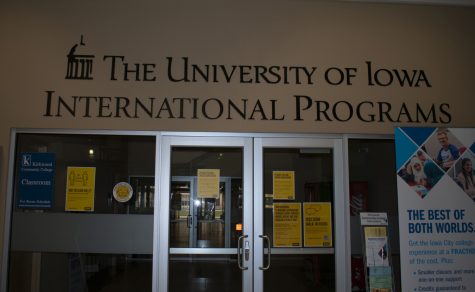State Board of Regents then President Bruce Rastetter announced the newly appointed President Bruce Harreld during a meeting in the IMU on Thursday, Sept. 3, 2015. Harreld is the 21st president of the University of Iowa. (Margaret Kispert/The Daily Iowan)
From ‘disappointment’ to a ‘seat at the table’, how Harreld changed shared governance
As the University of Iowa prepares to say goodbye to President Bruce Harreld, shared governance leaders look back at the impact he has had on the way the four branches interact with the leader of the university.
March 30, 2021
When Bruce Harreld first took the helm as the University of Iowa’s president in 2015, members of the four shared governance branches were initially hesitant.
Harreld’s appointment came after he was voted “least qualified” by faculty and community members, key constituents in the shared governance process touted by universities as a model for sharing responsibility among those affected by higher education administration decisions.
Alongside negative reviews from the UI community, the search also included closed door meetings with members of the state Board of Regents. These private meetings lead to a lawsuit, but were found to not violate Iowa’s Open Meeting laws.
Little did campus leaders know that this former businessman would evolve the way shared governance communicated with the top Hawkeye during his six-year tenure at the university.
As the UI prepares for Harreld to officially leave his position on May 16, the search process is again in motion to select another head Hawkeye. This time, leaders hope to avoid the contentious process that led to Harreld’s selection. The search committee plans to bring a handful of finalists to campus in mid-April, and the regents will select Harreld’s successor April 30.
While the regents’ initial selection of Harreld in 2015 was met with criticism and a chasm of mistrust in the 21st president, his six years at the UI has resulted in more frequent communication between the branches of shared governance and the Office of the President, leaders say.
Current leaders from the UI’s Undergraduate Student Government, Graduate and Professional Student Government, Faculty Senate, and Staff Council are looking to continue learning in more ways than one how to better communicate and share leadership responsibilities from Harreld’s time after he leaves. Harreld’s term as president increased the transparency of the position and allowed shared governance to better understand the president’s decisions, more than past presidents have, shared governance leaders told The Daily Iowan in interviews.
Once Harreld was selected as the UI’s 21st president in September 2015, the Faculty Senate declared a “no confidence” vote in the regents’ presidential-selection process, which means the body indicated it did not support Harreld and felt as though member opinions and feedback on the search process had not been considered. The two branches of shared governance that represent undergraduate and graduate students also presented a “no confidence” vote.
Within days of its vote, the UI’s Staff Council sent a statement to the regents expressing disappointment in the search process because of its “lack of transparency and disregard for the feedback provided by the UI community, which stands in contradiction to our valued principles of shared governance.”
Following the conclusion of the search, the UI Chapter of the American Association of University Professors surveyed faculty, staff, students, and community members in Iowa City to understand how they felt about the original four semifinalists. From more than 500 respondents, virtually none of them said Harreld was prepared to become president.
More specifically, the survey found that only 1.8 percent of the faculty who participated and 2.6 percent of other respondents found Harreld to be qualified, compared to 94 percent of faculty and 76 percent of other respondents believing Past Tulane University Provost Michael Bernstein was the most qualified semifinalist.
Past Staff Council President Hans Hoerschelman said there was a deficiency of trust in Harreld before he even entered office because of the little amount of support for the search process ending with little support from shared governance and the UI community.
“We had this huge deficit of trust that wasn’t of [Harreld’s] making, but that we all felt,” Hoerschelman said. “And shared governance and the campus community had to work through it. Harreld had been handed a lead weight at our first meeting with him that he had to carry and prove to people that he meant what he said.”
Hoerschelman said there was also a large schism between the branches of shared governance as well as their relationships with the Office of the President. He said the faculty, staff, and students rarely met to have conversations about common issues on or off campus before Harreld took his position in 2015.
On the heels of controversy, Harreld got to work immediately focusing on learning about shared governance and what he could do to improve the system, Hoerschelman said. Harreld reached out to campus leaders and set dates to meet them and start to have conversations to build trust in the administration, he said.
“From the beginning, we started off with a diplomatic reset where we knew we had baggage to deal with, but we wanted to move forward toward something better immediately,” he said. “Our biggest thing was that shared governance, and staff in particular needed to be included, so he helped us create a direct line to the president that we’d never had before.”
Current UI USG President Connor Wooff said he heard from past leaders of the organization that the biggest change Harreld made when he started his tenure at the UI was ensuring the students, faculty, and staff representatives communicated with one another frequently and effectively
For the first time, there were regular, in-person meetings between all branches of shared governance. While Wooff wasn’t on campus when Harreld began his tenure at the UI, he said connections were made between the faculty, staff, and student leaders on campus that continued during his administration.
“There was a concept of shared governance when Harreld came to campus, but it was not nearly as involved as it is today,” he said. “When he came to the UI there was a feeling that faculty, students, and staff were not engaged with the president or with one another. He utilized shared governance as a way to learn about the university and build connections.”
Wooff will graduate this May and USG will usher in a new administration later this semester and those students will handle the branch of shared governance under the interim and new president. Regan Smock and José Muñiz Jr. are campaigning to be the next USG president and vice president.
Undergraduate students were not the only students who were impacted by an increase in communication. Thomas Pak, the current financial director and former vice president of GPSG, started his M.D. and Ph.D. track at the UI in 2013, when Sally Kay Mason was the UI’s president. She left the UI in 2015.
When Pak joined GPSG in 2018, he said he only saw Harreld a few times, but that was enough to make a difference between Iowa and several other universities. At Big Ten conferences for student governments, Pak said it was clear that the UI’s president was the most accessible president in terms of meeting regularly when it came to student governments across the board.
“Our president always seemed more accessible than those of other universities,” he said. “We also saw that our graduate and professional government was stronger than other Big Ten graduate student governments. We’re very well developed and Harreld is a part of that.”
President of Staff Council Heather Mineart said Harreld sees shared governance as a valuable system in a way that few other university presidents do.
She said the UI’s system is in stark contrast with sister institutions because Harreld collaborates with all four branches of shared governance together and separately. Mineart said the UI’s shared governance groups meet more frequently with the top Hawkeye than other schools do with their leadership.
“The collaboration that we have with President Harreld is different than any other institution,” she said. “Our peers at other universities say traditionally staff leaders only meet with their president once or twice a year at best, and we meet monthly. It’s clear that shared governance is truly a key stakeholder on campus and we’re fortunate to have Harreld backing us.”
While the branches of shared governance continue to evolve and adapt to different leadership and circumstances every year, Mineart said the four groups were strengthened by Harreld’s tenure and she hopes they will continue to be once a new president is selected.
“Harreld is happy to answer questions and he’s approachable,” she said. “He wants our feedback and when looking for a new president, we want someone with a similar shared governance approach.”
At a joint USG and GPSG meeting in Sept. 2018, Harreld stressed the value of collaboration among the branches of shared governance.
“If we’re really on the same team, we have a direct obligation to bring each other up,” he said.
In an interview with the DI in 2018, Harreld said — since he’s been on campus — he’s prioritized shared governance decision making since taking the helm of the institution.
“…[There were] very few meetings where faculty, the staff, and students all in the same meeting, and so I was kind of the coordination point and said, ‘This is not good,’ so we’ve actually created a process where we’re all involved in most of the issues simultaneously, which makes it healthier, more creative, probably more complaining, but that’s part of the process,” Harreld said.
COVID-19
The pandemic has offered another opportunity for shared governance to strengthen the institution, said Wooff.
“We meet more frequently as shared governance and with the administration than in past years because of COVID,” Wooff said. “That’s something that’s different from previous years, but it has given the opportunity for us to check in with university leadership about issues important to our constituencies on a regular basis.”
Despite the improved relationship between the president and shared governance, Harreld and USG haven’t agreed all the time.
The first Tuesday of the fall semester, Harreld attended a virtual USG meeting where senators and executive board members questioned and criticized the head Hawkeye on the university’s COVID-19 response (at the time, the UI reported hundreds of new student COVID-19 cases a day) and action on racial justice.
The student government bodies also released two statements breaking with Jessup Hall ahead of the fall start. The first was publicized in June after law enforcement agencies tear gassed protesters; student leaders called on Harreld to end the UI’s working relationships with the Iowa City Police Department. The second urged the UI to move to all-virtual instruction two weeks before the fall semester began.
During the COVID-19 pandemic, a large conversation in shared governance was about helping students financially.
UI Presidential Search
Since Harreld announced his retirement in October, the UI has been working to find a new head Hawkeye — and to ensure the process follows better regulations than the 2015 search.
In 2016, after Harreld was selected, the American Association for University Professors added the UI to its list of sanctioned institutions after finding the search process by the state Board of Regents in 2015 “seriously infringed Association-supported standards of college and university governance.”
The 2020-21 presidential search committee, however, has a shared governance subcommittee that allows for the leaders of shared governance on the committee to collaborate and advocate for their constituencies.
As the current search process continues, shared governance groups have multiple seats at the table, including all four branch presidents. In the 2015 search, there was only one representative from USG, GPSG, and Staff Council, while there were seven representatives from the Faculty Senate.
The application portion of the search closed on March 15, and USG, GPSG, Faculty Senate, and Staff Senate representatives are focusing on the needs of their constituencies in the process.
Vice President of Faculty Senate Teresa Marshall wrote in an email to the DI that Harreld’s collaborative efforts with shared governance will not be forgotten when he leaves.
“We appreciate how accessible President Harreld and his staff have been with faculty during his tenure, and we wish President Harreld the best in his retirement or next adventure,” she said. “At the moment we are focusing on ensuring that the next president will arrive with a strong commitment to upholding shared governance principles and partnering with faculty on all major decisions.”
Moving Forward
On March 25, the UI announced Harreld will officially leave his position on May 16. The regents will name a new president at its April 30 meeting after consulting with the UI Presidential Search Committee. The regents last week named current Graduate College Dean John Keller to serve as the UI’s interim president once Harreld departs.
As the DI previously reported, Keller’s appointment will be finalized at a regents meeting on April 14. Keller previously announced he would transition from his role as dean of the graduate college to a position in the Provost’s Office as a special assistant and professor in the College of Dentistry.
Harreld is walking away from $2.33 million when he leaves in May. He won’t be a UI employee in any capacity after his last day, so he will not collect any deferred compensation.
As the university prepares to say goodbye to the 21st president, it is clear that Harreld made a mark on the UI’s shared governance system that is at the forefront of leaders’ minds, Pak said.
“He is highly committed to shared governance and he takes our conversations seriously,” he said. “From my interactions with him, Harreld always wants to hear what we as shared governance [have] to say and we’re thankful for that.”
From the moment he stepped on campus, Hoerschelman said Harreld was ready to ensure a smooth transition and build trust in a way few presidents ever have. He said Harreld visited buildings former presidents had never been to in order to get feedback from staff members on the university.
“We had executive committee meetings in buildings [Harreld] would never have seen otherwise,” he said. “We gave him a tour of places prior presidents had never seen and we kept doing that. It gave him a reason to be seen by people and receive feedback that would enrich his future decision making.”
Harreld also created an opportunity for the four branches to have meetings multiple times in an academic year, said Hoerschelman — something he hopes future presidents will maintain to ensure shared governance always has a dialogue going with the university president.
Wooff said Harreld’s door has always been open to shared governance and he has extended a seat at most UI tables for USG. He said he hopes the next president will continue the tradition and embrace the system Harreld solidified over the past six years.
“Harreld has strengthened the process to the point where there are times shared governance has challenged the president and the provost on issues where we disagreed,” he said. “…Whether we agree or disagree, there’s always a seat at the table for us. It’s always been clear to us from President Harreld that we own that seat, and he always wants to hear from us. Not a lot of other institutions can say that.”




